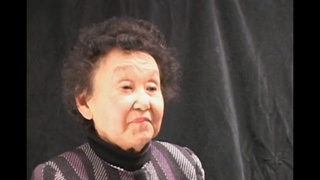Interviews
Camp as a positive thing
Everything in camp could be a positive thing. Every person you meet, you know, that you never met before or you hear what town they came from, or if they were farmers or fisherman or what, you know. I mean, to me I didn’t think of that experience as being such a negative thing. I thought, everybody goes through changes through life—after all, look at what our parents, they left their home country and came here. And here, we just went from our hometown to this camp that I didn’t think… and I had told all the Sunday school kids, “Your life hasn’t even begun yet. You don’t even know what you’re gonna go through five years from now, ten years from now, twenty years from now…” And so, I mean, I thought it’s good to prepare them that this isn’t the worst thing that could happen. And then, of course, afterward when I learned about slavery and the way blacks were treated, I thought to myself, “My God! I mean, how can we complain where others have been treated so much worse…”
Date: June 16, 2003
Location: California, US
Interviewer: Karen Ishizuka, Akira Boch
Contributed by: Watase Media Arts Center, Japanese American National Museum.
Explore More Videos

The hardships of life in Japan during World War II
(b. 1927) Japanese American Nisei. Family voluntarily returned to Japan during WWII.

Neighbor took care of hotel business during the World War II
(1918-2023) Nisei Japanese kabuki dancer

Family background of Fredrick Yoshihide Sasaki
(b. 1918) Issei businessman in Canada

Anti-Japanese sentiment at the time of World War II
(b. 1918) Issei businessman in Canada


Family life in a Japanese Canadian internment camp in Slocan
(b. 1920) Incarcerated during World War II. Active member of the Japanese Canadian community

Lack of political power led to camps
(1924-2018) Researcher, Activist

The Perspective of Youth
(1923–2006) Community activist. Co-founded the Manzanar Committee

Choice to move east or go to Japan
(b.1920) Japanese Canadian Nisei. Established the Ikenobo Ikebana Society of Toronto


Institutionalization as a bad aspect of camp
(1924-2018) Researcher, Activist

State Department records show concern for treatment of Japanese American internees
(1924-2018) Researcher, Activist

Different tension between East Coast and Los Angeles
Japanese American Creative designer living in Japan

Remembering December 7, 1941
(1923-2011) Lawyer, MIS veteran, founder of Francis and Sarah Sogi Foundation

Meeting Japanese Americans from the mainland in MIS
(1923-2011) Lawyer, MIS veteran, founder of Francis and Sarah Sogi Foundation
